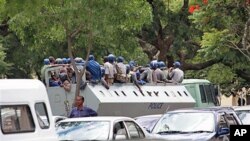With political tensions rising, as well as the numbers of those in detention, Zimbabwe's President Robert Mugabe has stepped up the government security presence in some Harare townships.
Internet calls for street protests similar to those in North Africa did not emerge Tuesday, but Harare is bracing itself for a Zanu-PF anti-sanctions rally in the capital on Wednesday.
Shortly after businesses opened on Tuesday, a column of about 40 police vehicles, including several water cannons, travelled into town via a main road. People in the street said they did not know why there was such a show of force.
Protest campaigns fall flat
There were campaigns on Facebook calling for a "million man march" against the 31-year rule of President Robert Mugabe. The campaigns calling for protests on Tuesday, though, did not lead to gatherings.
Most people in the city center said they had not heard about the Internet campaign and none gathered at the city park venue named by the organizers of the Facebook campaign, who call themselves FreeZimActivists.
A Harare lawyer, John Hamunakwadi, said people did not know about any planned march, nor did they know who was organizing it. He said the police and army would know in advance about any planned marches, and also noted that street protests in Zimbabwe are rare.
"The difference of those Arab nations and Zimbabwe is that Zimbabweans are so timid, and it is difficult even to gather 50 at any moment, and police in Zimbabwe know the fact, " said Hamunakwadi.
Last week the European Union extended financial and travel restrictions on Mugabe and most of his colleagues in the hierarchy of Zanu-PF, along with some state companies.
Zanu-PF rally planned
Zanu-PF said it will collect 2 million signatures at a rally to be held in the capital to protest what it calls illegal sanctions against Zimbabwe.
Hamunakwadi said Zanu-PF had prepared itself well for its anti-sanctions campaign rally as many Zanu-PF leaders are still in Harare following President Robert Mugabe’s birthday party on Saturday.
"Those who were at the 87th birthday for Robert Mugabe are still at their hotel up to now, they haven’t checked out until the anti-sanctions campaign," said Hamunakwadi.
At his party, Mugabe said he would ensure that action was taken against western companies operating in Zimbabwe. The longtime president blames Zimbabwe's failed economy on western sanctions.
"The sanctions, sanctionism, sanctions that continue to be on us. I am that glad the party decided on Wednesday we will launch our anti-sanctions campaign," said Mugabe.
Mugabe cracks down
The campaign comes as authorities hold more than 80 people in detention on charges such as threatening assault and political violence. Most are anti-Zanu-PF campaigners, including three legislators from the Movement for Democratic Change (MDC).
Forty-six of them are accused of treason for attending a discussion on the uprisings in North Africa. Police say they were plotting to overthrow Mugabe’s constitutionally elected government.
According to defense lawyer Alec Muchadahama, about 10 appear to have been assaulted in detention, and have been refused medical attention.
The judge did not arrive at court Monday, when Muchadahama planned to call for the charges to be dropped.
MDC, in a two-year-old inclusive government with Zanu-PF, has called for an end to partisan policing and for replacement of the attorney-general, Johannes Tomana, who is a prominent member of Zanu-PF.




